Málaga is more than a beach destination for sun-starved Northern Europeans.
This thriving port city on the southern tip of Spain has a rich history and is crammed with art galleries and museums. It has a charming old town and is home to a monumental cathedral and a majestic castle.
But what are the best things to see if you have just two days in Málaga? Dive into my road-tested itinerary to explore the city where the sun shines for more than 300 days a year.
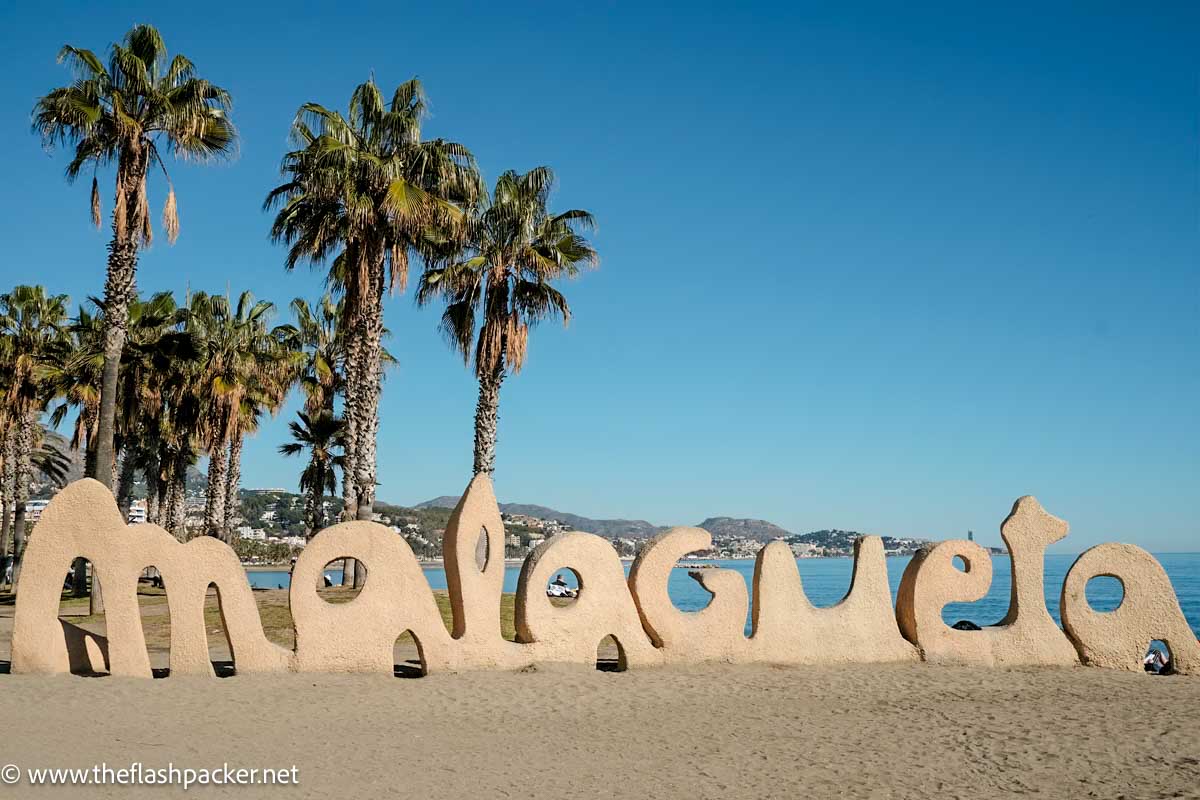
Some articles on this website contain affiliate links. This means that I may earn a small commission if you make a purchase through these links. As an Amazon Associate, I earn from qualifying purchases. Read the full disclosure here.
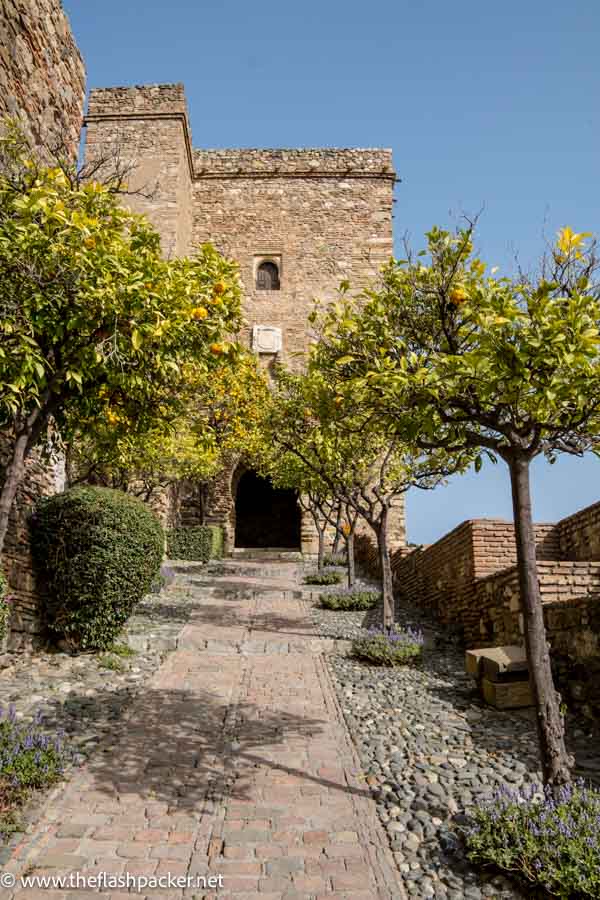
DAY ONE: EXPLORING MÁLAGA’S HISTORY
Gibralfaro, Alcazaba, Roman Theatre, Málaga Cathedral, Bishop’s Palace, Flamenco show
DAY TWO: PICASSO AND THE BEACH
Picasso Museum, Centre Pompidou Málaga, Muelle Uno, Malagueta Beach, Sunset catamaran cruise
BEST WAY TO GET AROUND MÁLAGA: On foot
BEST MONTHS TO VISIT MÁLAGA: Spring & Autumn. December is also popular.
How I Did It
I spent five days in Málaga as a solo traveller, visiting all the attractions recommended in this itinerary.
I was pleasantly surprised at how much there was to do in Málaga. Allow two or three days in Málaga to see the city’s main cultural and historical highlights with enough time left for the beach.
If you have more time to spare, venture out of town. Thanks to Málaga’s excellent transport connections, it is easy to take easy day trips to Marbella, Cordoba, Granada and the like.
My Suggested 2-Day Málaga Itinerary
DAY 1: DISCOVER MÁLAGA’S HISTORY
I recommend you spend your first day in Málaga in and around its charming Old Town. This day’s itinerary takes in the key historical sites, building in time to mooch around the street and squares of the historical centre.
Málaga was founded by the Phoenicians in the 8th Century BC and prospered as a trading port for the Romans from 218 BC. After the fall of the Roman Empire in the 5th Century AD, it was held by the Vandals and the Visigoths until the Moors invaded early in the 8th Century.
In 1487, the city was taken by Christian forces, after which it declined. It was not until the 19th Century that Málaga would see its fortunes reversed.
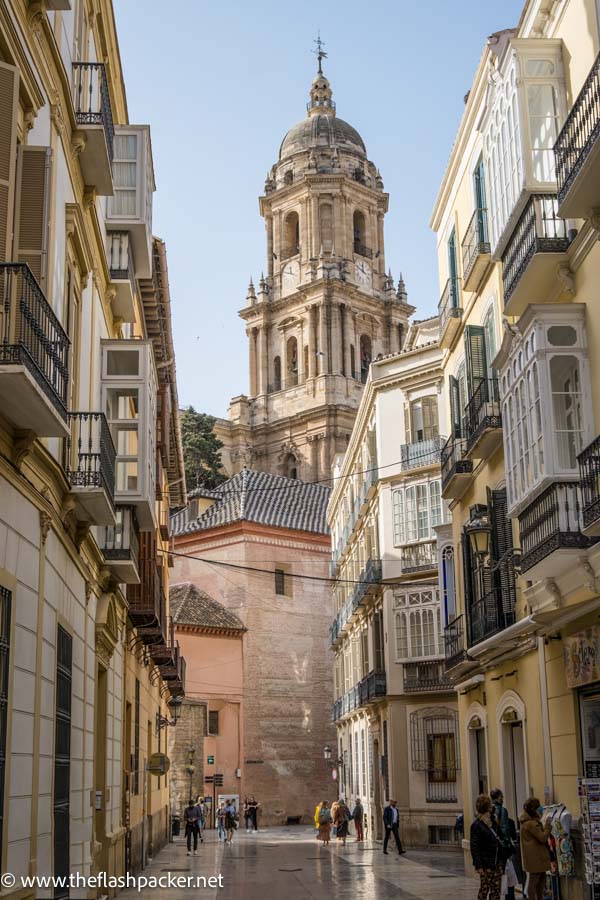
There has been a market in Plaza de la Merced since at least the 15th Century and its roots can be traced back to the Romans. Plaza de la Constitución has been the beating heart of Málaga since the Moorish period.
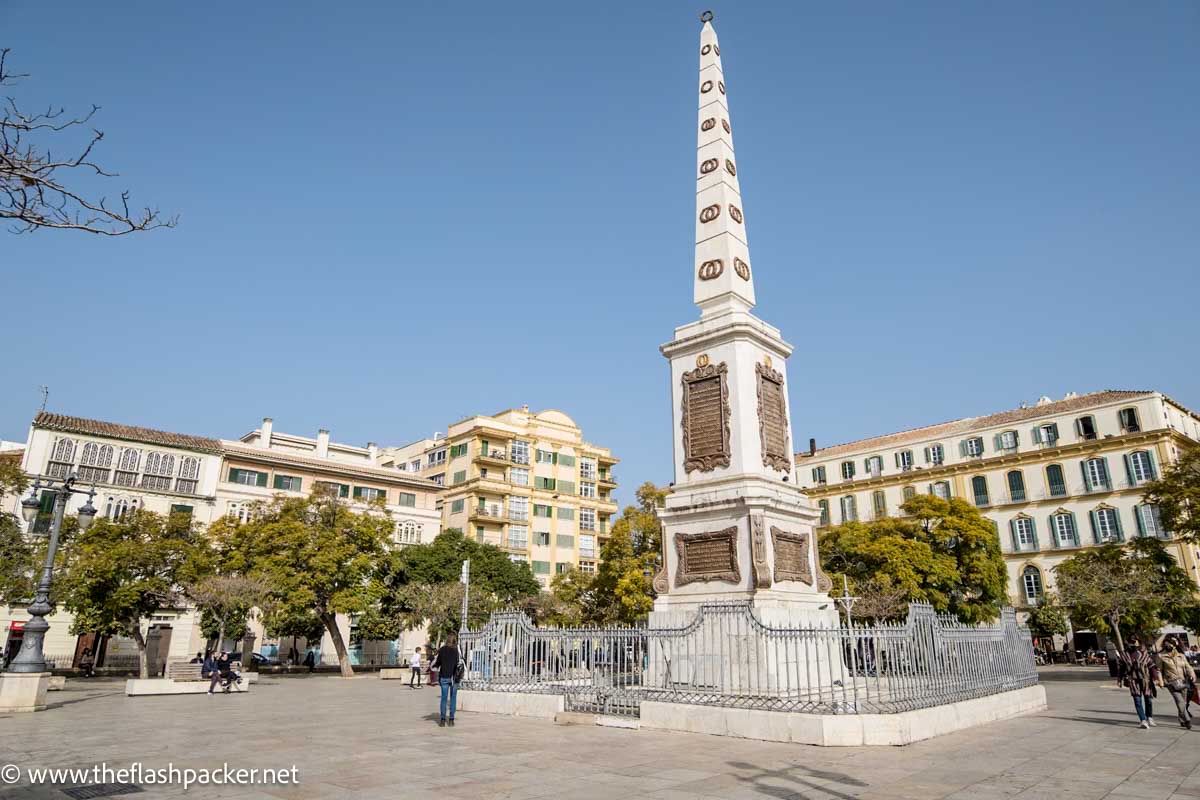
If you want to learn more about Málaga’s Old Town, join a free walking tour with Explore Málaga. The local guides are a mine of knowledge and this tour will help you get the lay of the land.
These 90-minute tours run every day at 11:00 and 13:00 from Plaza de la Constitución. At the end of the tour you give the guide the amount you consider fair (these guys and girls earn a living through these tips).
Castillo de Gibralfaro
The Gibralfaro Castle (Castillo de Gibralfaro) dominates Málaga.
The original 10th-century castle was enlarged by Yusuf I of Granada between 1344 and 1354 to protect the Alcazaba and to house troops. Following the reconquest, it acted as a temporary residence for the Catholic monarchs.
From its lofty height, there are magnificent views over Málaga, its port and the Mediterranean. It’s said that you can see Morocco on a clear day.
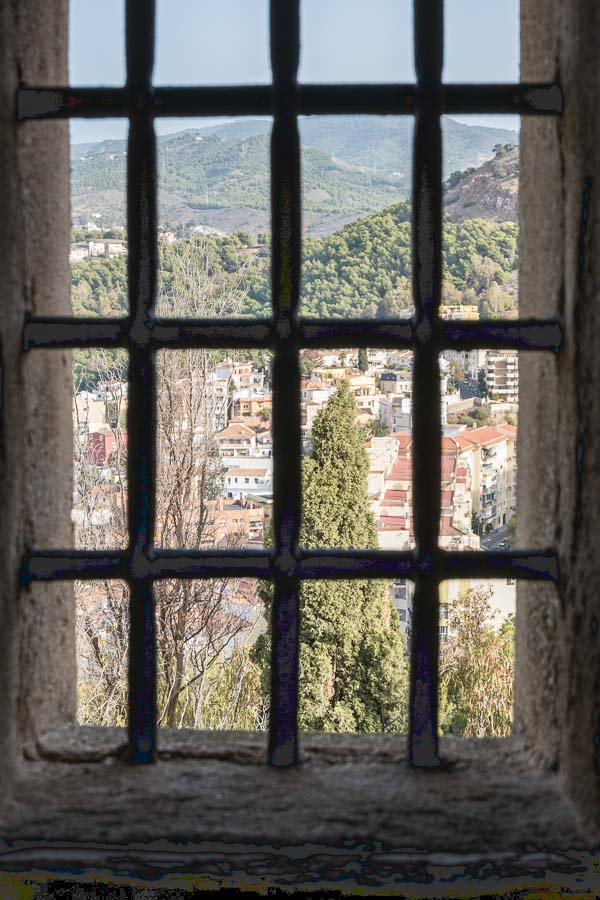
Gibralfaro has seasonal opening times and there is a small admission fee (free admission on Sundays after 2 p.m.).
Getting to the Gibralfaro Castle
I went there on foot, taking the path that winds its way around the side of the Alcazaba. This walk is spectacularly pretty but also spectacularly steep. I don’t advise tackling it in the heat of the midday sun.
Try to visit the Gibralfaro Castle first thing in the morning to avoid the heat of the day, and to avoid tour groups and cruise passengers. When I was walking back down, there was a steady procession of people huffing and puffing their way up the hill.
Bus number 35 makes the journey to the Gibralfaro from Avendida Andalucia, Alameda Principal or Paseo del Parque. The castle is also served by the hop-on-hop-off bus.
The Alcazaba
Málaga’s magnificent Alcazaba crowns Gibralfaro hill. It was built by the Moors between the 8th and 11th Centuries on the site of the former Roman town and served as the residence of the Arab Emirs, who created an independent kingdom upon the break-up of the Western Caliphate.
Wandering along the Alcazaba’s pathways, lined with orange trees and bougainvillaea, is a delight.
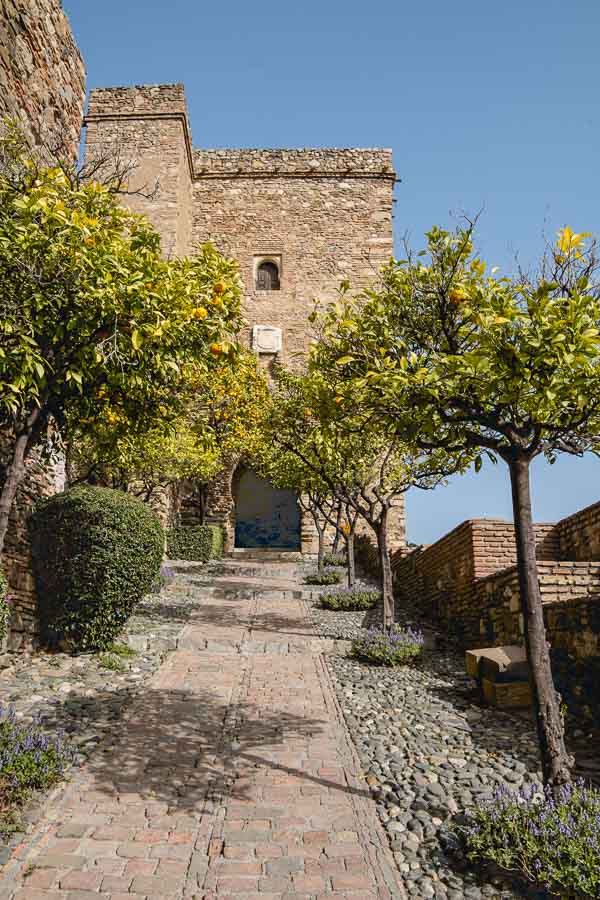
To reach the inner palace, you walk through a succession of graceful gates, designed to keep intruders at bay. Some of these used recycled Corinthian columns from the Roman theatre in their construction.
Narrow canals from the upper levels of the palace feed the tinkling fountains in the Spanish Arab Gardens. Although extensively reconstructed, the Nasrid Palace is a younger, more peaceful cousin of its more famous namesake at the Alhambra in Granada.
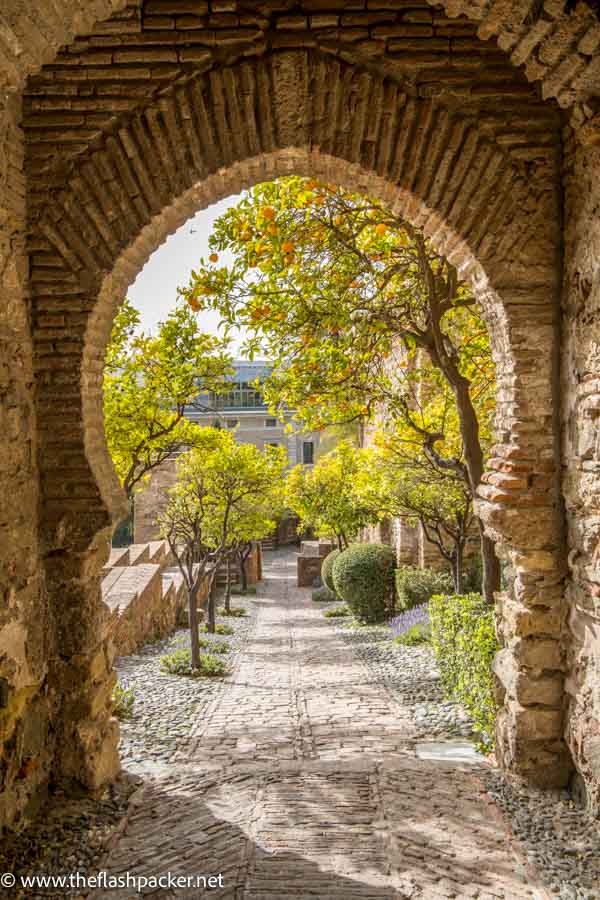
And if that’s not enough, there are spectacular views across Málaga, the sea and the countryside beyond.
The Alcazaba is open daily and seasonal opening times apply. There is a small admission fee (free admission on Sundays after 2 p.m.).
The Roman Theatre
In the shadow of the Alcazaba is the oldest monument in Málaga.
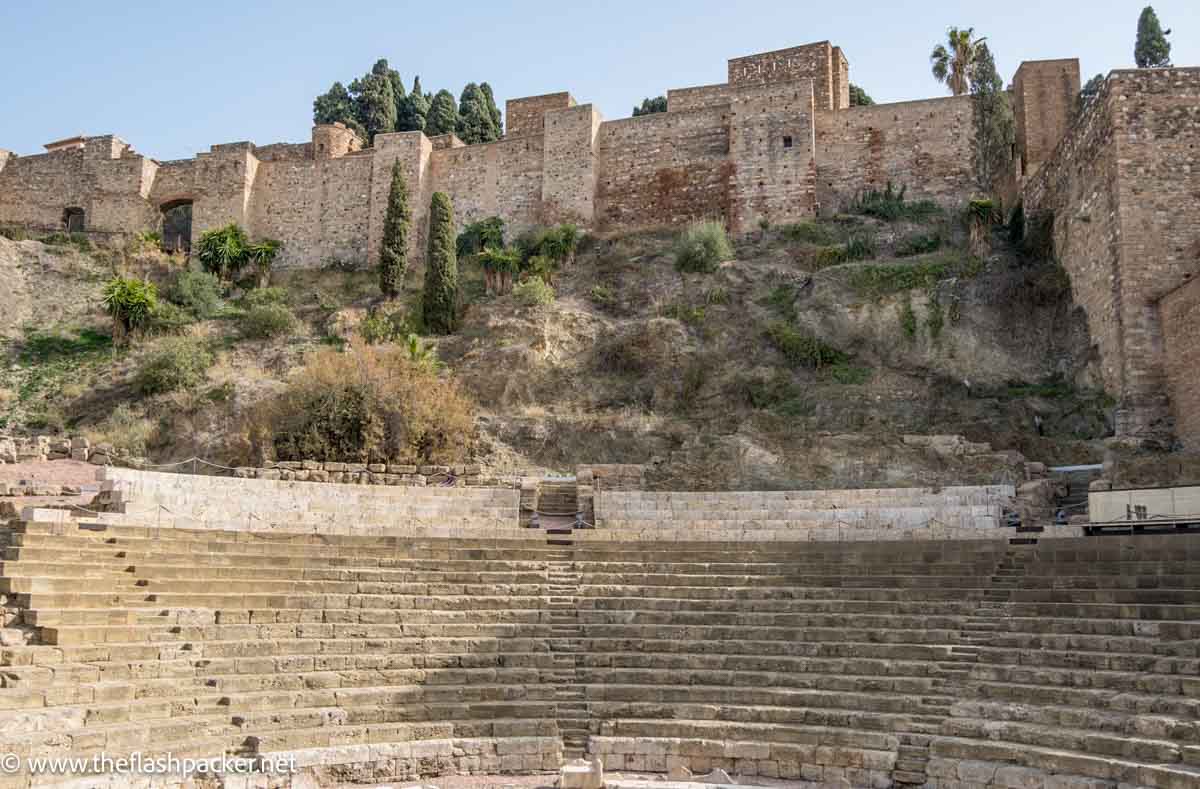
Built during the reign of Augustus in the 1st Century AD, the Roman Theatre. was only discovered as recently as 1951. It remained in use until the 3rd Century.
Next to the Roman Theatre, there’s an interpretation centre that houses a few archaeological discoveries from the site.
The Roman Theatre is particularly attractive when it is lit up at night.
Málaga Cathedral
Don’t leave town before paying your respects to the One-Armed Lady.
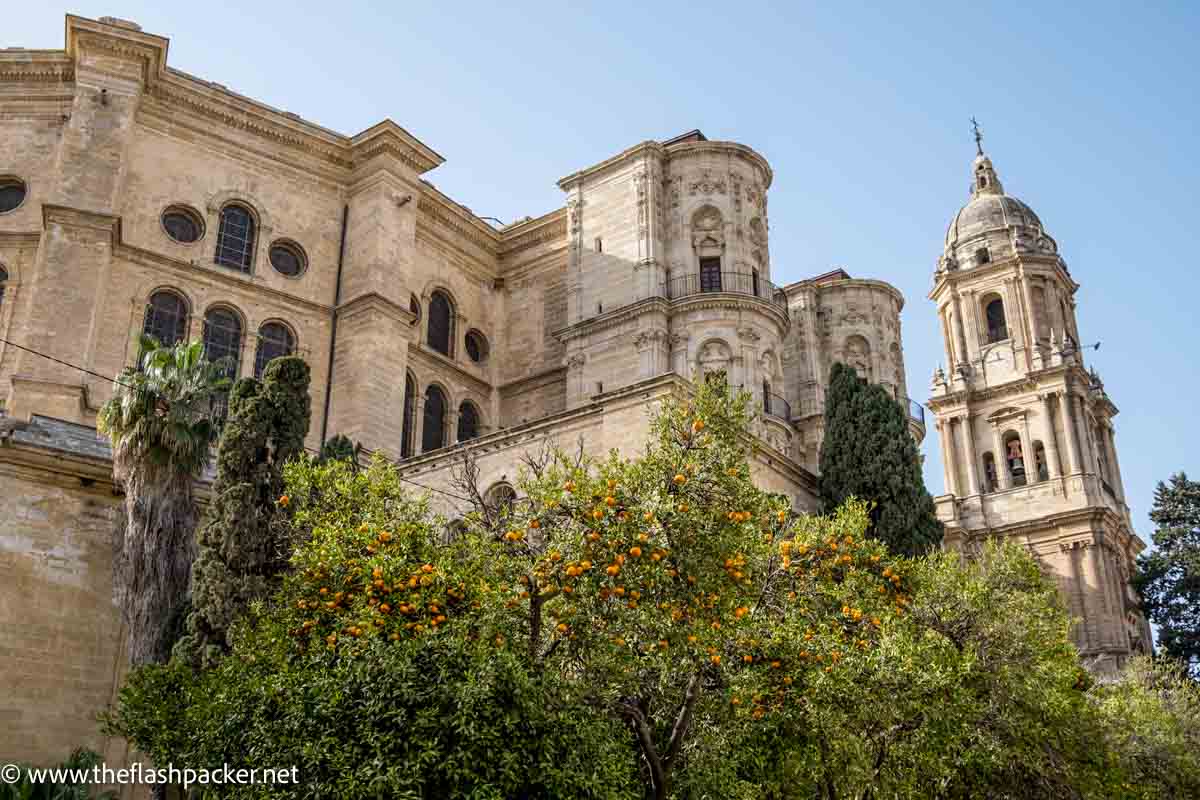
Málaga’s unfinished cathedral lacks a tower on its west side, earning it the popular nickname La Manquita. It has an outstanding collection of paintings and sculptures and a sublime 17th-century wooden choir.
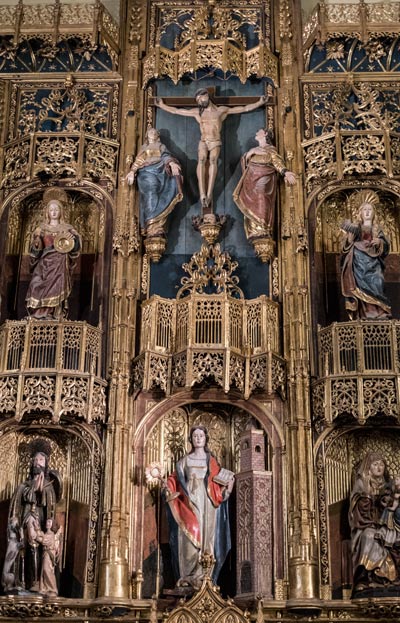
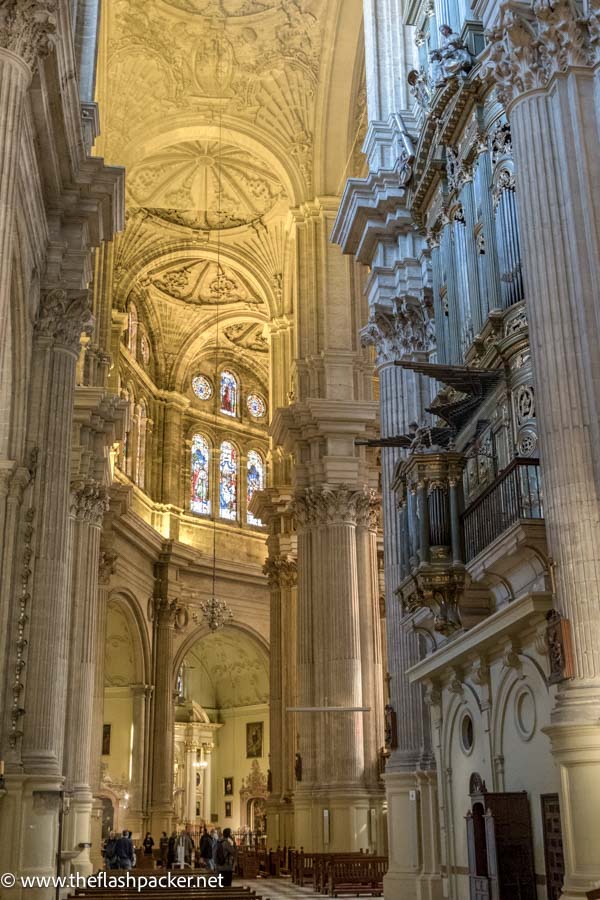
It’s well worth paying a few more euros to join one of the escorted visits to the cathedral’s roof for the views across Málaga.
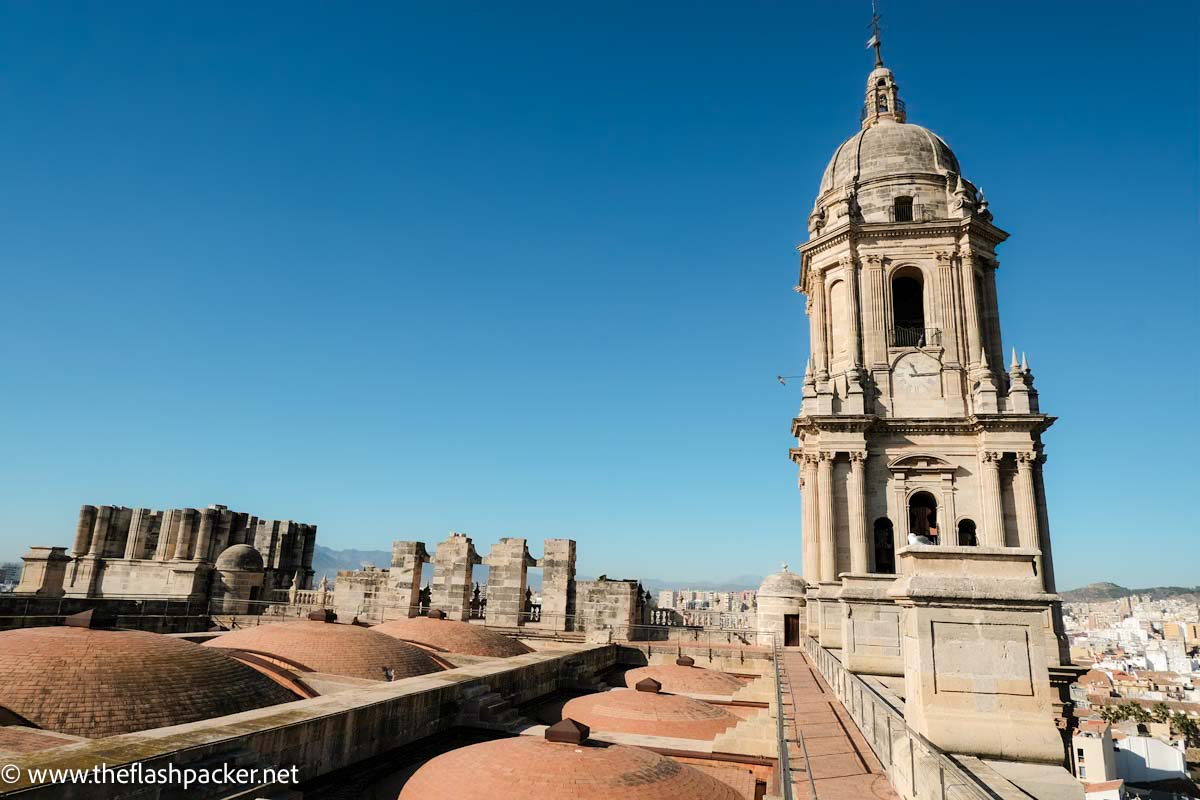
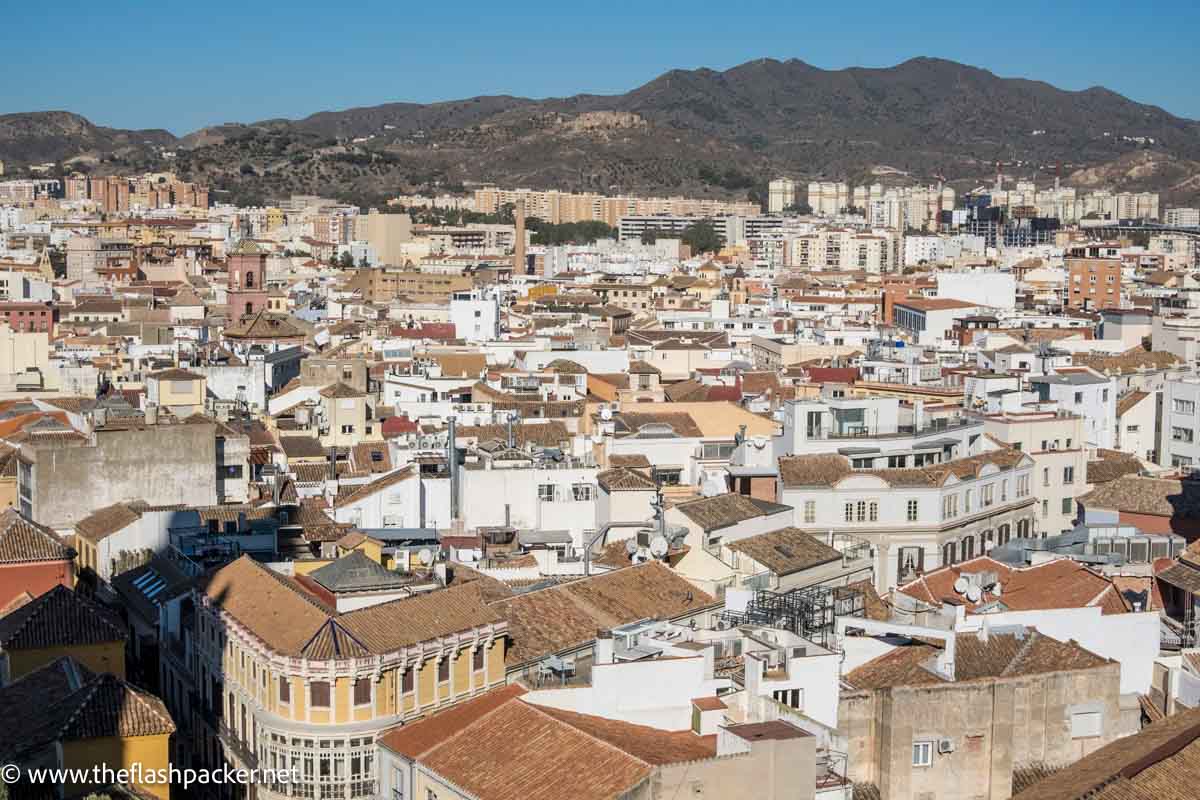
Málaga Cathedral and its roof are open daily and an admission fee applies.
READ THIS NEXT: 10 Málaga Cathedral Facts to Know Before You Visit
Go to a flamenco performance
Few things capture the spirit of Andalusia than flamenco. With its pulsating rhythms, the yearning songs and expressive guitar playing, the passion is almost palpable. I went to one in Granada and was captivated.
When you are visiting this region of Spain you must go to a flamenco show. Forget the image of frills and castanets, the slightly kitsch flamenco used to promote Spain during the Franco era. This is the real deal.
If Málaga is your only stop in Andalusia, do attend a flamenco show on one of your evenings there. This tablas (flamenco venue) has been highly rated by other travellers.
>>> CLICK HERE TO BOOK YOUR FLAMENCO TICKET
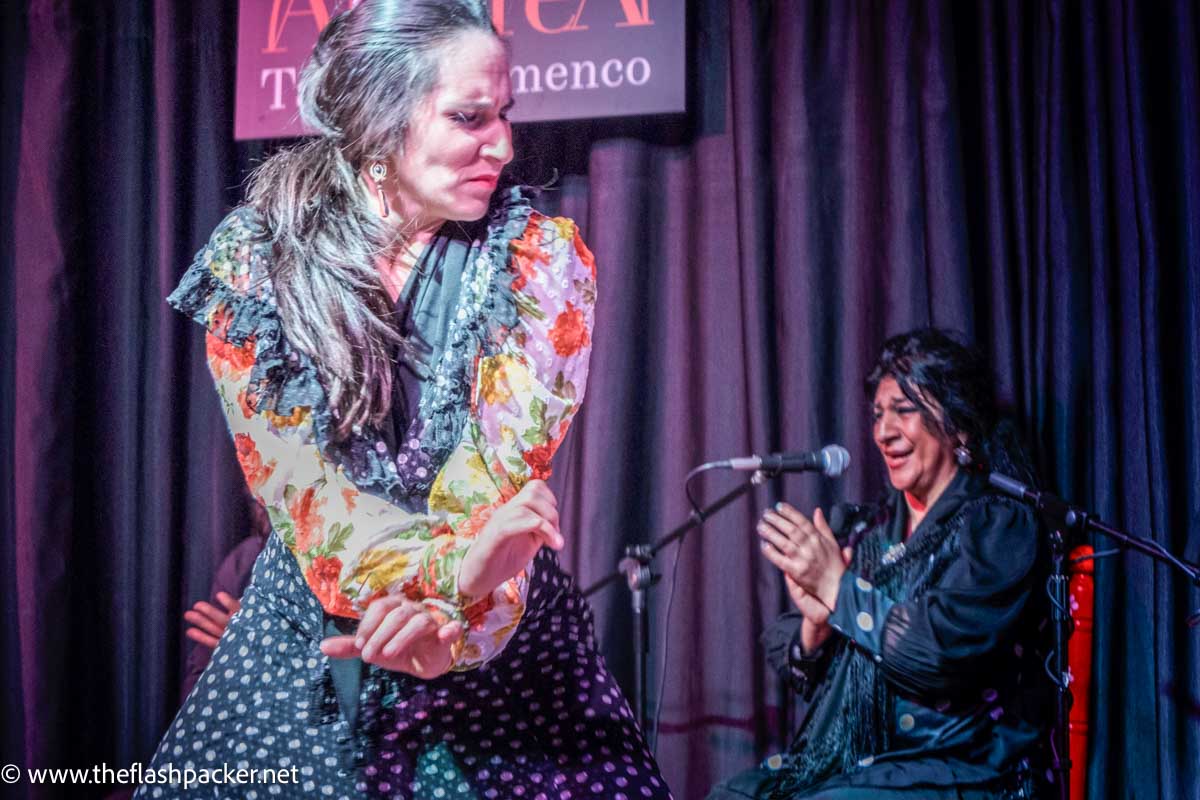
DAY 2: PICASSO AND THE BEACH
The second half of your Málaga 2-day itinerary is a little more relaxed.
Start your day by paying homage to Málaga’s favourite son. Soak up the sun by spending quality time around the port area and on Málaga’s best city beach.
Finally, as the sun goes down, round off your day with a sunset catamaran trip.
Picasso Museum
Pablo Picasso was born in Málaga in 1881 and lived there for the first ten years of his life. The Picasso Museum fulfils the artist’s wish to return some of his works to his home city.
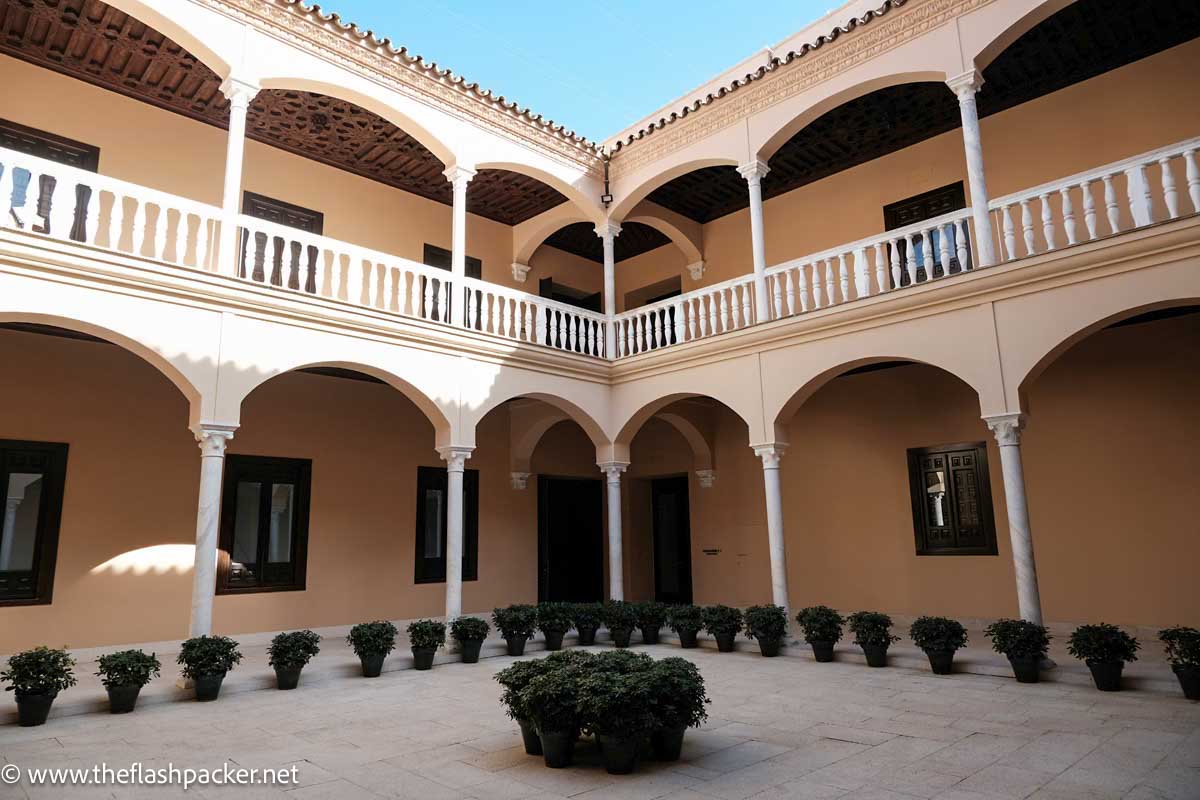
Covering the 80 years of Picasso’s prolific career, his artworks are displayed in thematic and chronological order over 11 small rooms. I also learnt a lot about the women in his life; two wives and three partners, with the exception of his second wife he outlived them all.

The Picasso Museum Málaga is open daily. Your ticket includes an excellent audioguide.
>>> BUY YOUR SKIP-THE-LINE TICKET HERE
Centre Pompidou Málaga
Walking from the Picasso Museum to the port, it’s not hard to miss Málaga’s Pompidou Centre.
This contemporary art museum, which opened in 2015, is known as “The Cube” thanks to its steel and stained glass skylight that resembles a Rubik’s Cube.
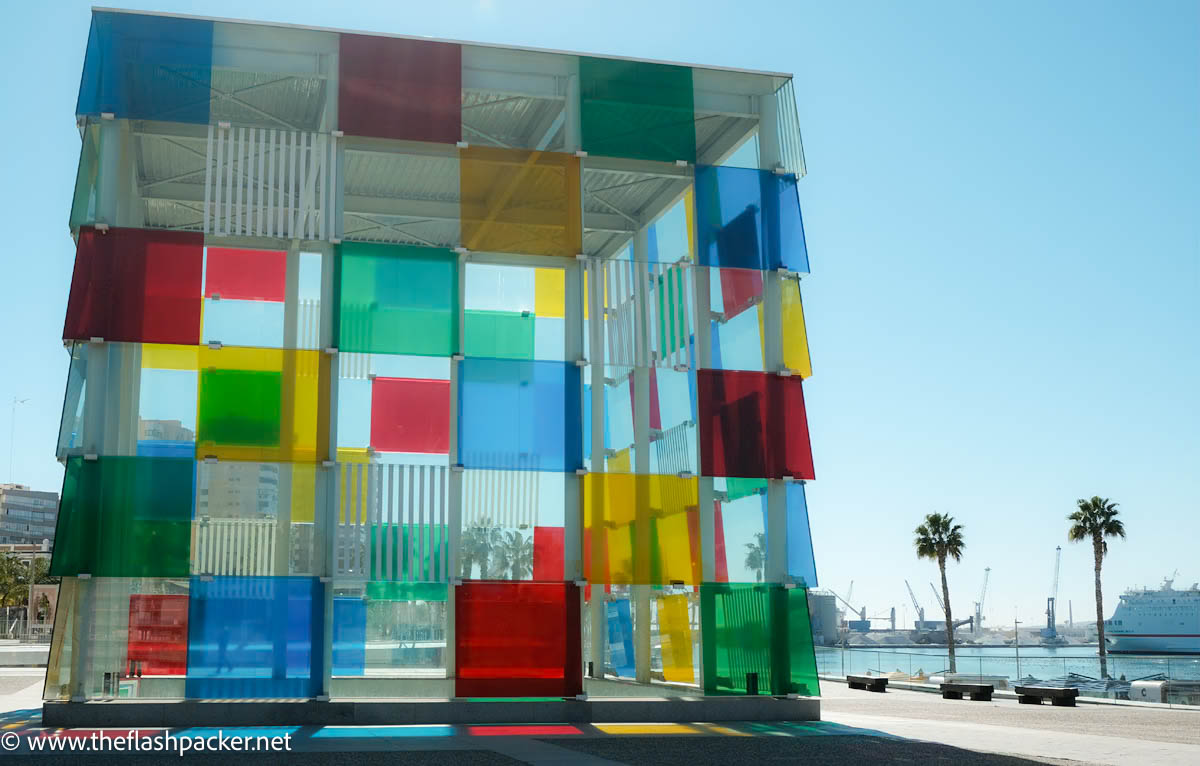
Inside, its permanent collection comprises 70 works selected from the Pompidou Centre’s collection of 20th and 21st Century art. These pieces are rotated every two or three years. There are also temporary exhibitions.
Málaga’s Pompidou Centre is open Monday, Wednesday, Thursday, Friday, Saturday & Sunday. An admission fee applies
Muelle Uno
This delightful pedestrian promenade, lined with bitter orange and palm trees, flanks the port of Málaga. It’s a lovely spot to stop for a drink or something more substantial.
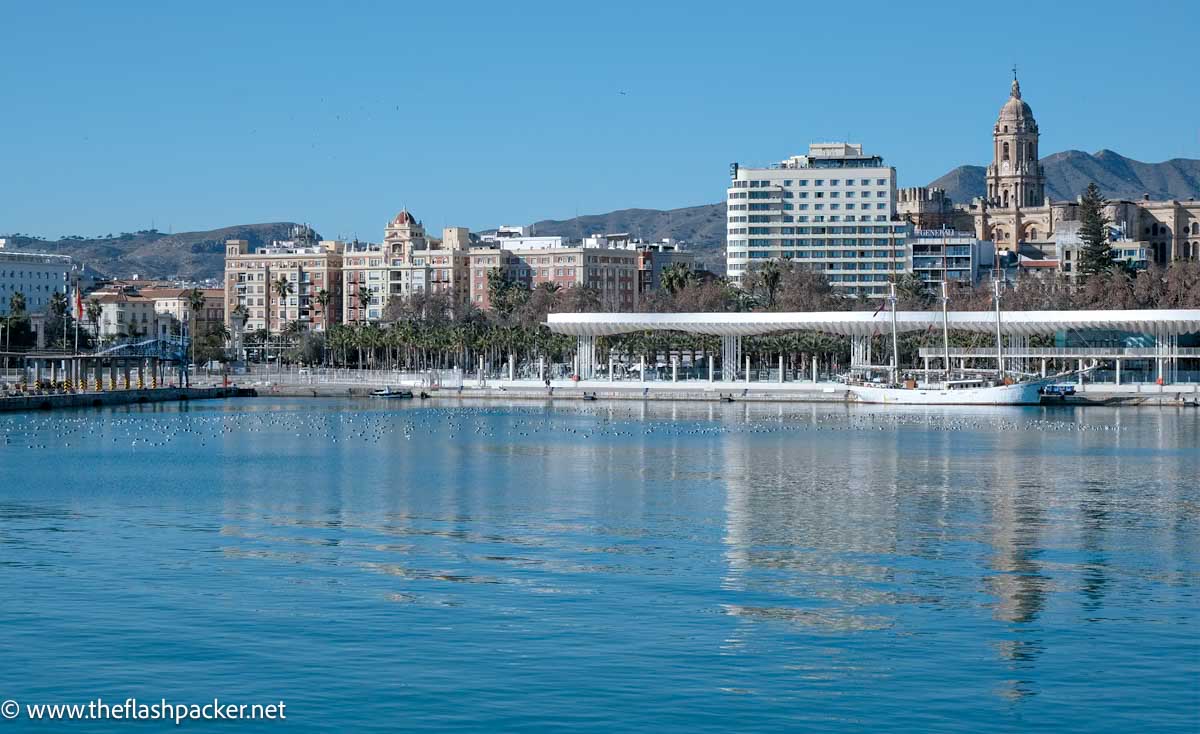
Malagueta Beach
La Malagueta is the closest beach to the city centre.
This dark sandy Blue Flag beach stretches for 1.2 km between the Port of Málaga and La Caleta Beach. Towering palm trees occupied by vocal parrots line its oceanfront promenade.
It’s the perfect place to relax and enjoy grilled fish.
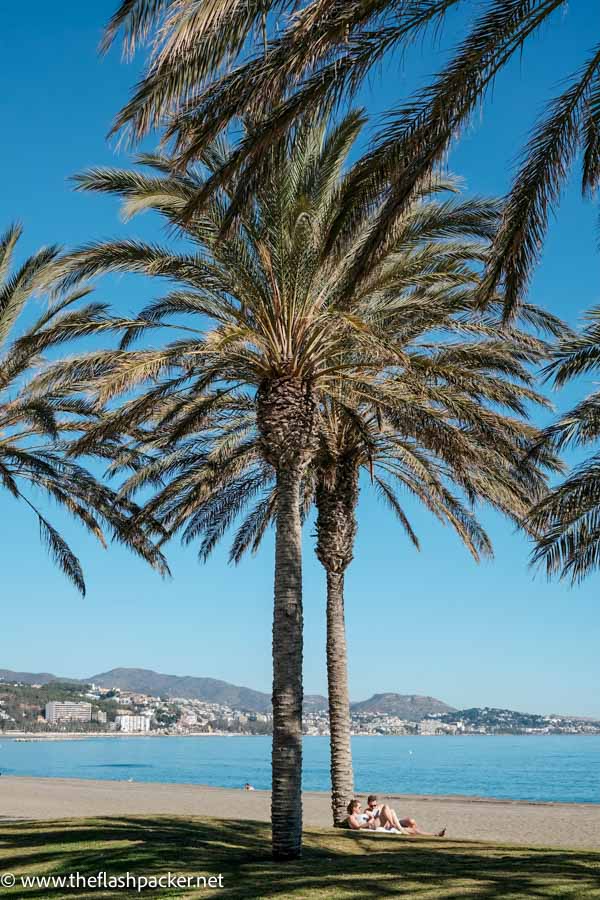
Take a sunset catamaran cruise
Taking a one-hour boat cruise is one of the most popular things to do in Málaga. What could be a better end to your weekend break than watching the sun set over the sea whilst sipping a chilled glass of Cava?
>>> CLICK HERE TO BOOK YOUR TICKET
If You Have More Than Two Days in Málaga
What you do in Málaga will depend on your tastes and interests, how relaxed you wish your itinerary to be and the length of time you spend there.
Iglesia de Santiago
The Church of Santiago is the oldest Christian building in Málaga and is a testament to the city’s rich history.
Established in 1490 on the ruins of a former mosque, it is an excellent example of a Gothic-Mudéjar building. This architectural style, born from a fusion of Christian and Islamic elements, can be seen throughout Andalusia.
Inside, it features highly decorative side chapels and artistic treasures by Alonso Cano and Niño de Guevara. The magnificent Baroque altar is an 18th-century addition.
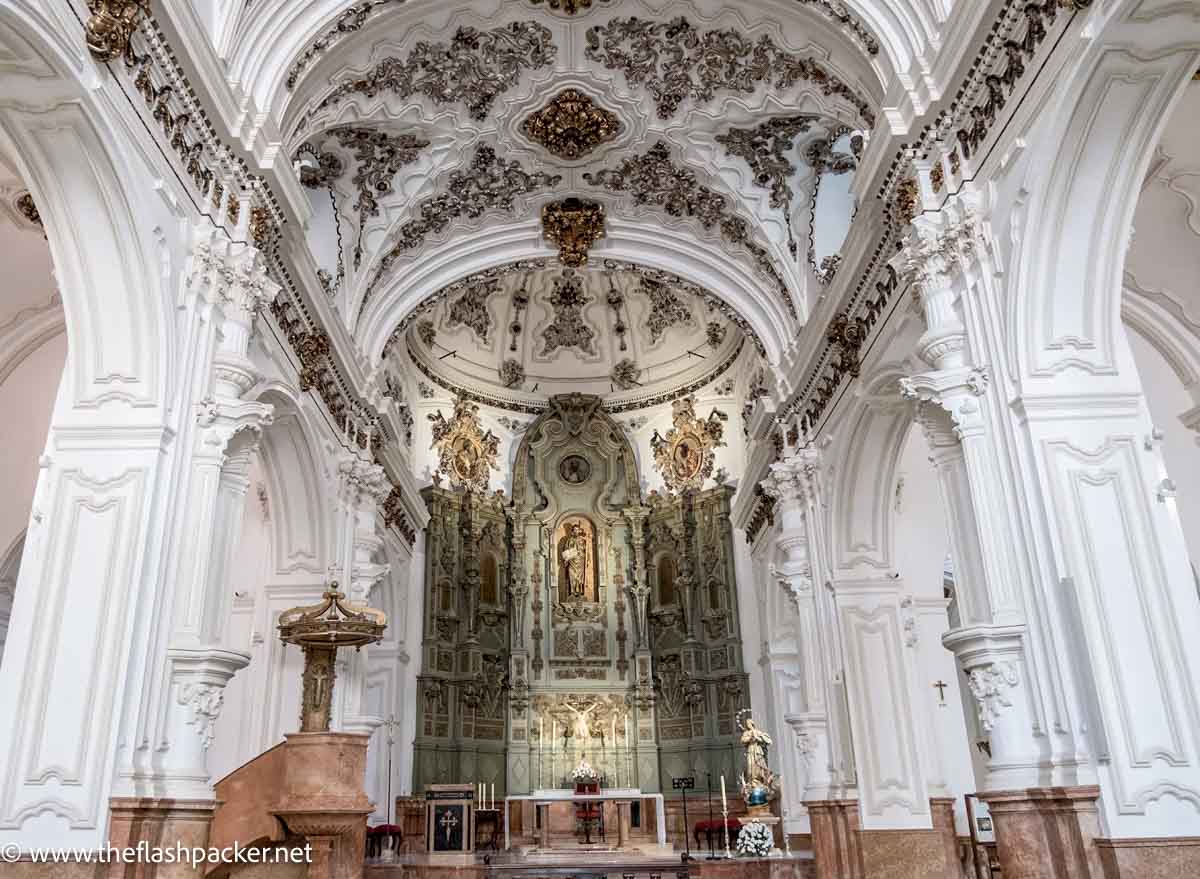
Turn around to look at the outside of the church as you leave.
The blocked-off central door is from the original Mudéjar church, as is the square tower. Following the tradition of minarets, this tower was designed to sit separately from the church but was attached to it in the 16th Century.
Pablo Picasso was christened at the Iglesia de Santiago in 1881.
Address: Calle Granada, 62
Málaga’s street art
Since 2013, Málaga has offered its walls as blank canvases for artists across the globe.
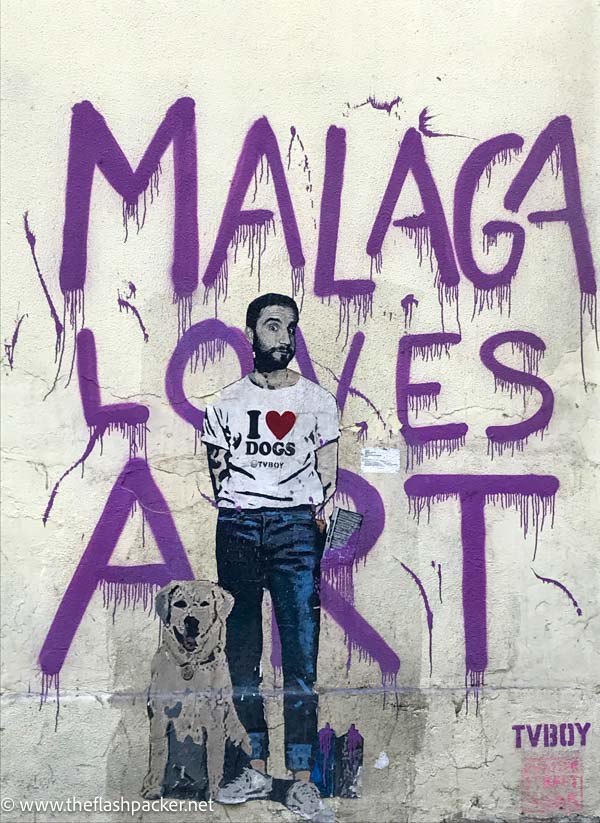

The brainchild of MUAS (Málaga Arte Urban Soho), it has transformed previously rundown neighbourhoods into an urban outdoor art gallery. This initiative has attracted some of the world’s best street artists.
Hunt for street art in Málaga in Soho, which lies between the port and Alameda Principal, and around Calle Victoria. Useful street art map here.
READ THIS NEXT: Must-See Málaga Street Art: Spain’s Outdoor Art Gallery
Shop for fresh produce in Atarazanas Market
The striking Atarazanas Market started life as a Nasrid shipyard in the 14th Century. It was then used as a barracks and a military hospital until it became a market at the end of the 19th Century.
Its monumental entrance is a Moorish keyhole-shaped arch, whilst its rear façade features a stained glass window that wouldn’t look out of place in a church.
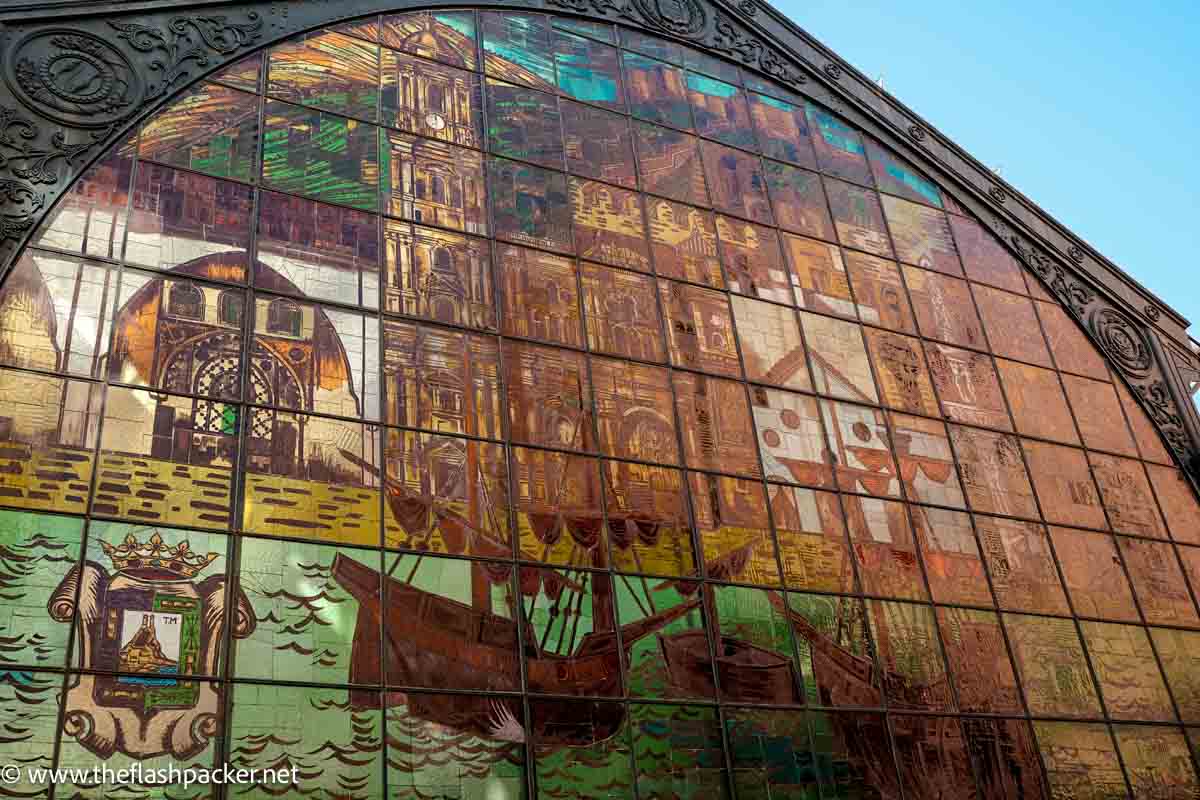
With its multitude of food stalls and small bars, this is an excellent place to stock up on fresh produce or to stop for lunch.
The Atarazanas Market is open from Monday to Saturday, from 8 am to around 2-3 pm
Address: Calle Atarazanas, 10
Relax in the Arab Baths
If you need a break from a hard day sightseeing in Málaga, relax at Hamman Al-Andalus
Soak up the ambience of Moorish Málaga, whilst sipping on mint tea, before selecting your preferred massage.
This oasis of tranquillity is open from 11 am until 10 pm daily.
>>> CLICK HERE TO BOOK YOUR VISIT
Visit Iglesia del Sagrado Corazón
Iglesia del Sagrado Corazón is Gothic revival in all of its pointy perfection.
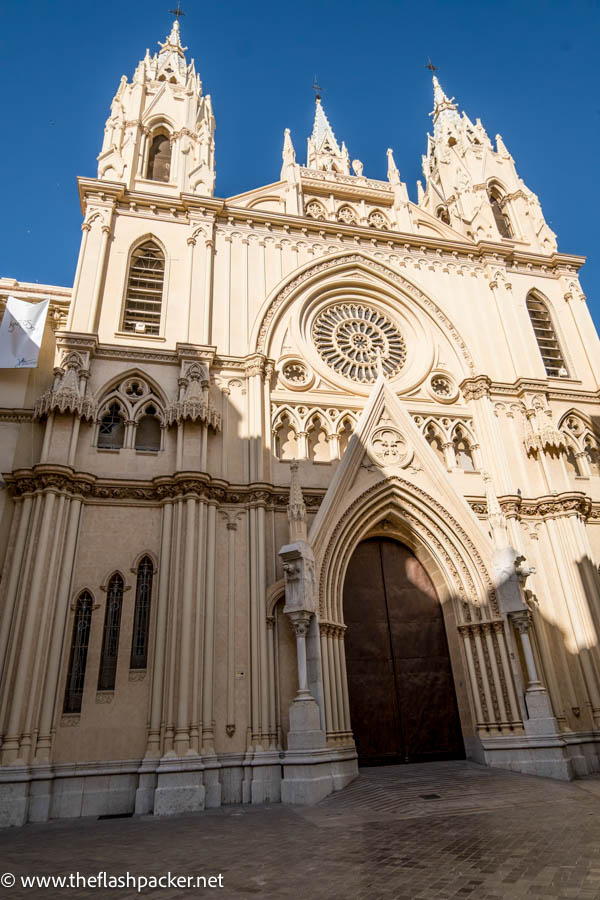
This hidden gem in the middle of the historic city is new compared with many other sacred spaces in Málaga. Commissioned by the Jesuits and designed by Fernando Guerrero Strachan, the so-called Gaudí of Málaga, it dates from 1920.
Its façade is built with a biscuit-coloured stone, featuring Gothic tracery that glows in the late afternoon sunlight. However, inside it is relatively plain.
Address: Pl. de San Ignacio
Visit Museo Carmen Thyssen Málaga
Housed in a 16th-century palace, the Museo Carmen Thyssen Málaga displays late 19th and early 20th-century artworks from Baroness Carmen von Thyssen-Bornemisza’s personal collection. These are on loan to the museum until 2025.
The museum is closed on Mondays.
Address: Pl Carmen Thyssen – C Compañía, 10
Best Time to Visit
Thanks to its balmy climate, Málaga is a year-round destination.
I visited in February when the orange trees were groaning with fruit, afternoon temperatures were in the low to mid-20s and the city was gearing up for its Carnival celebrations. With fewer visitors than in peak season, seeing the best that Málaga can offer was a delight.
If I was returning to Málaga, I’d aim to visit between March and May. Not only are temperatures warmer, including the sea temperatures, but trees are in bloom. The autumn (fall) months have similarly comfortable temperatures.
If, like me, you are not keen on intense heat, avoid the summer months (June, July and August).
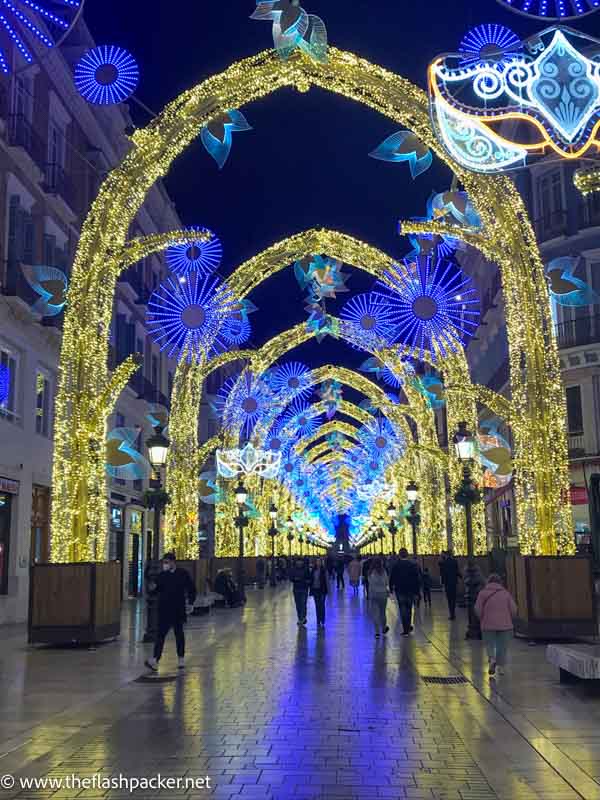
Getting There & Getting Around
By train
Thanks to Spain’s AVE high-speed trains, arriving in Málaga by rail is a breeze.
For example, trains run to Málaga from Madrid (from 2 hr 30 minutes), Seville (from 2 hours), Valencia (from 5 hours) and Barcelona (from 6 hours). Book in advance for the best fares.
Málaga’s main Maria Zambrano station is located a mile southwest of the Old Town. There is also a second station – Málaga Centro Alameda – which is the terminus for the C1 line to Fuengirola and the C2 line to Álora.
By bus
Taking a bus is sometimes quicker than taking a train in Spain. Málaga’s bus station is located next to Maria Zambrano train station.
By air (+ getting from Málaga Airport to the city centre)
Málaga Airport is the main air hub for the Costa del Sol and is served by several airlines. It is one of the easier airports to get to and from, located a mere 8 km from central Málaga.
The cheapest way to get from the airport to the centre of Málaga is to take the C1 train, bound for Málaga Centro Alameda. Alight at the last stop unless you are changing trains at Maria Zambrano station.
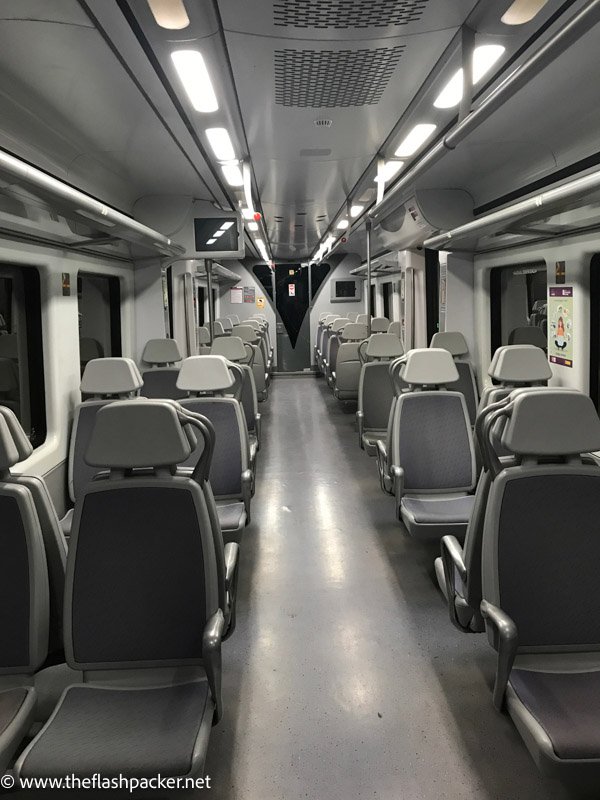

The journey between Málaga Airport and Málaga Centro Alameda takes 11 minutes and trains run every 20 minutes. Purchase your ticket from the machine.
If you prefer to catch a taxi from Málaga Airport to the city centre.
Getting Around
If you stick with this Málaga itinerary, you shouldn’t need to use public transport. The city’s main attractions are scattered across a very walkable area and the best way of getting around is on foot.
If you prefer, there is the inevitable hop-on-hop-off (HOHO) bus service.
>>> CLICK HERE TO BUY YOUR HOHO TICKET
Where to Stay
Choose accommodation in Málaga in the Old Town area or the trendy Soho district. These adjoining areas are close to the city’s main attractions, have plenty of accommodation to suit all budgets and there are lots of restaurants and bars from which to choose.
Here is where I stayed:
Mid-range apartment: Suites del Pintor
I stayed in this sunny, well-designed apartment in the Old Town which is a great self-catering choice in Málaga. The washing machine, Nespresso machine and roof terrace were bonuses, and there were a few good supermarkets close by.
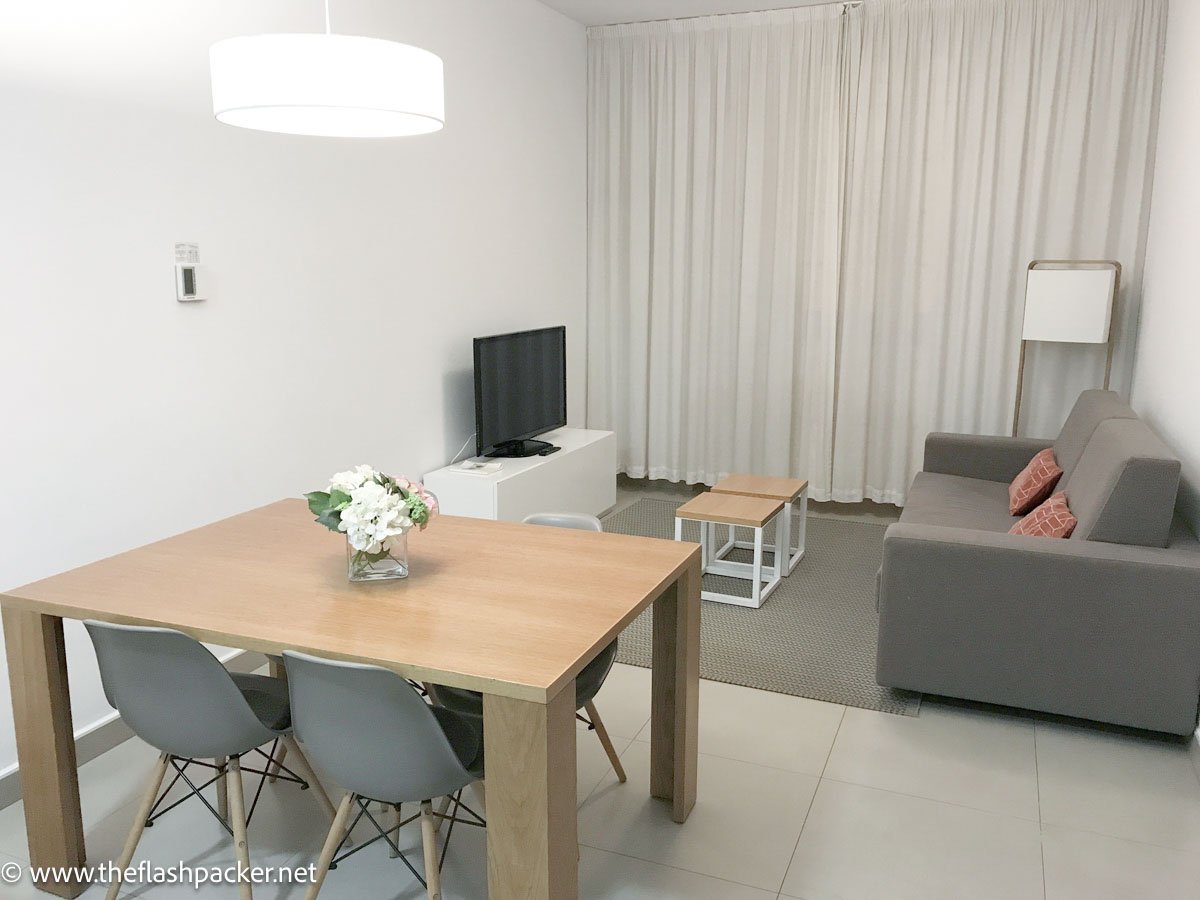
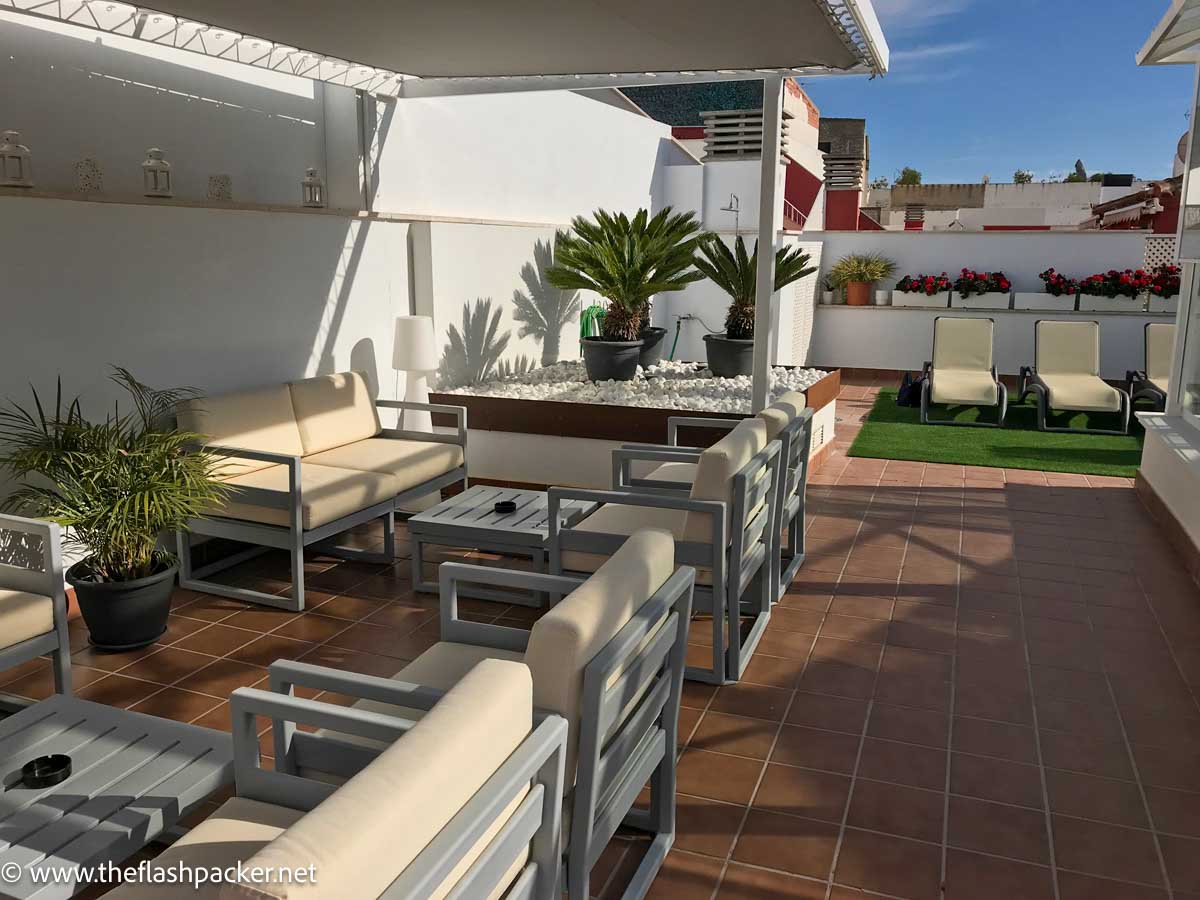
>>> CLICK HERE TO CHECK RATES & BOOK
Luxury hotel: ICON Malabar
I also stayed in this wonderful new hotel in Soho. It is stylish, is in a superb location and its staff could not have been more helpful.
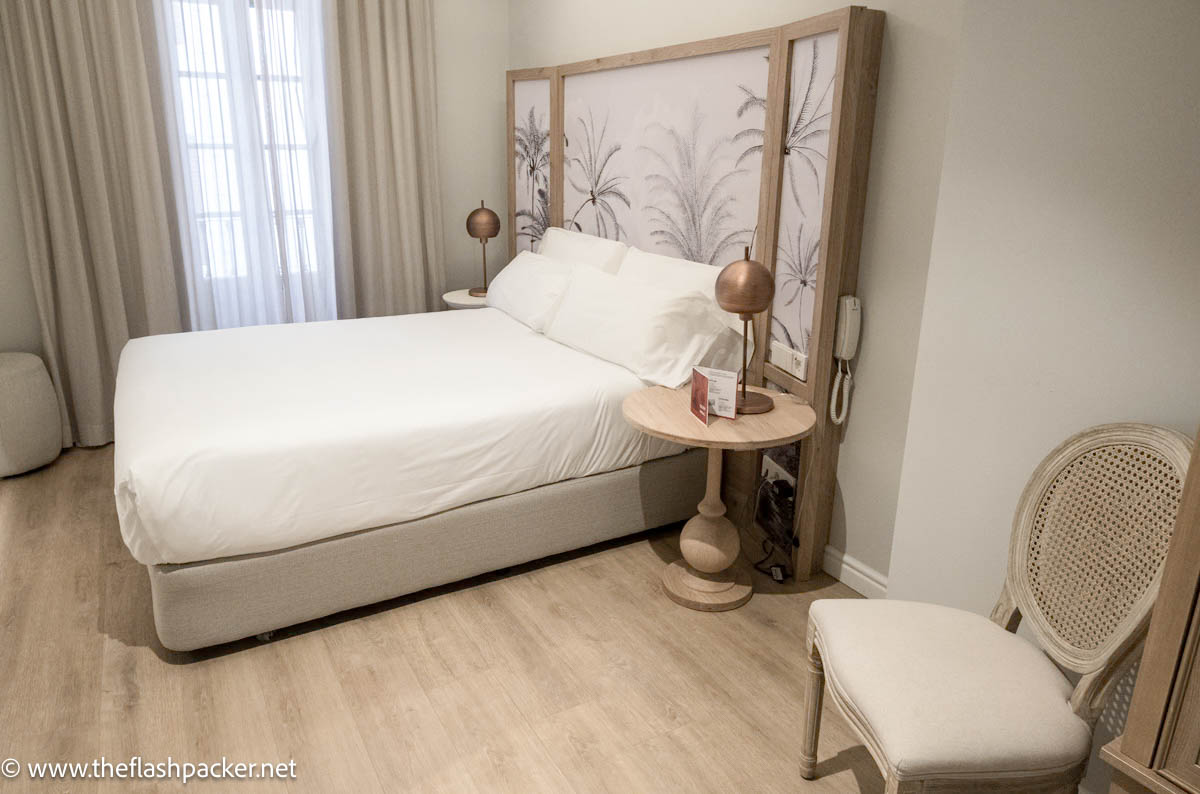
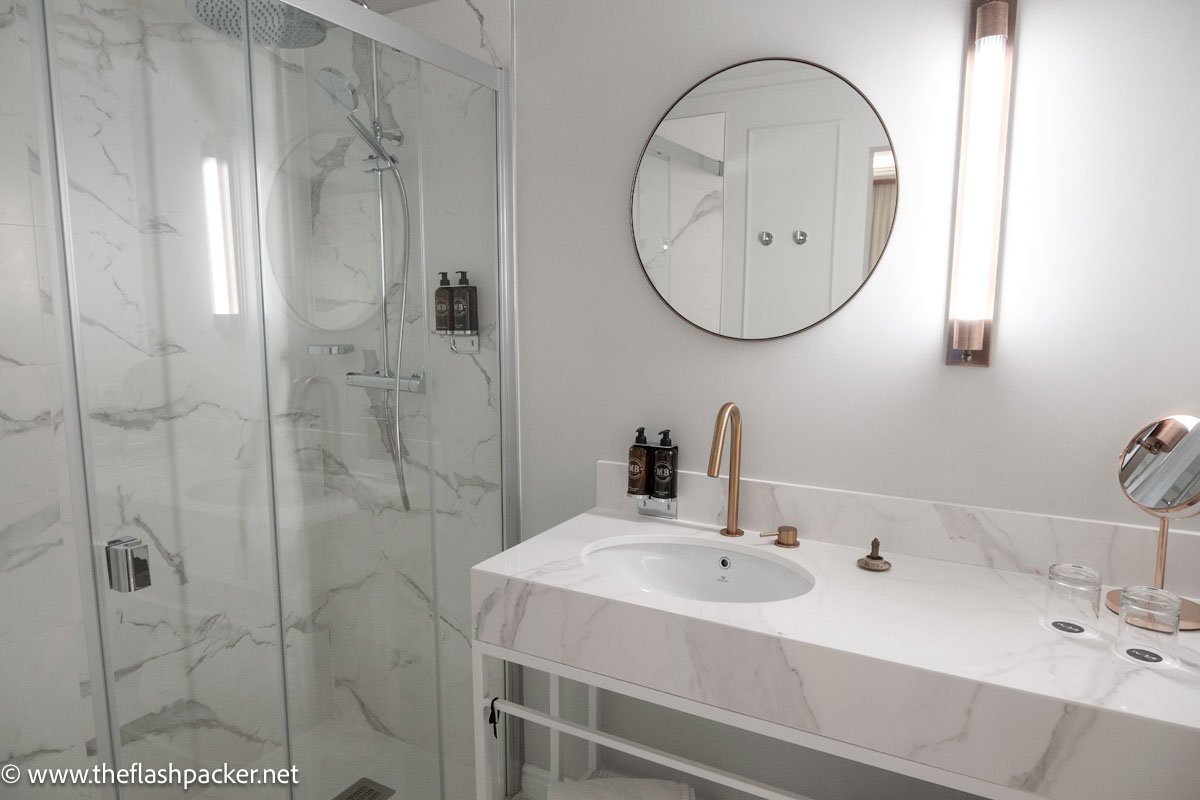
>>> CLICK HERE TO CHECK RATES & BOOK
My Favourite Places to Eat in Málaga
There is a seemingly endless choice of bars and restaurants in Málaga. You won’t go hungry.
Here are a few places that I tried and can recommend. But wherever you eat, try Málaga’s famous fried fish at least once during your stay.
Café Bar Moran
This friendly breakfast spot in Soho serves cheap coffee and tostada with a smile.
Address: Calle Tómas Heredia, 12
If you fancy a break from tapas, head to this hidden gem of a French restaurant in Soho. It is open for breakfast and lunch daily and for dinner on Friday and Saturday.
Address: Calle Casas de Campos, 31
This was an excellent suggestion from the reception staff at the ICON Malabar hotel. This Old town restaurant provides excellent food and service. Try their squid rings in a black bao bun.
Address: Pl. de Uncibay
Another top recommendation was this cosy tapas restaurant in the shadow of the Roman Theatre.
Address: Calle Alcazabilla 1
This cosy traditional tapas bar on the edge of the Old Town served one of my best meals whilst I was travelling in Southern Spain. Service is friendly but just take care about which wine you choose. Some of the wines by the glass are extremely pricey.
Address: Calle Álamos, 11
Day Trips from Málaga by Train or Bus
Málaga is an excellent base for day trips to other wonderful places in Andalusia. My suggested destinations are doable as day trips using public transport.
- How to get from Málaga to Marbella: Avanza bus
- Journey time: From 45 minutes
- More information: One Day in Marbella (+ How to Get from Málaga to Marbella)
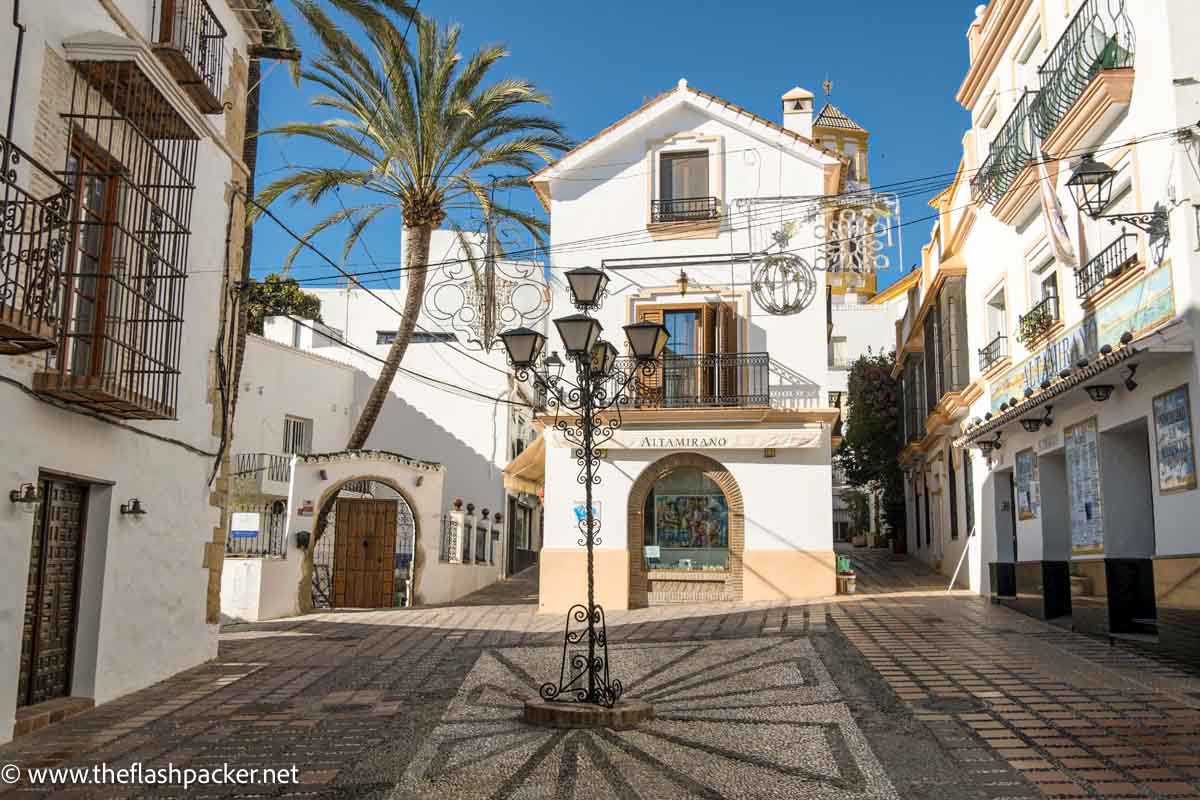
- How to get from Málaga to Córdoba: Train
- Journey time: From 50 minutes
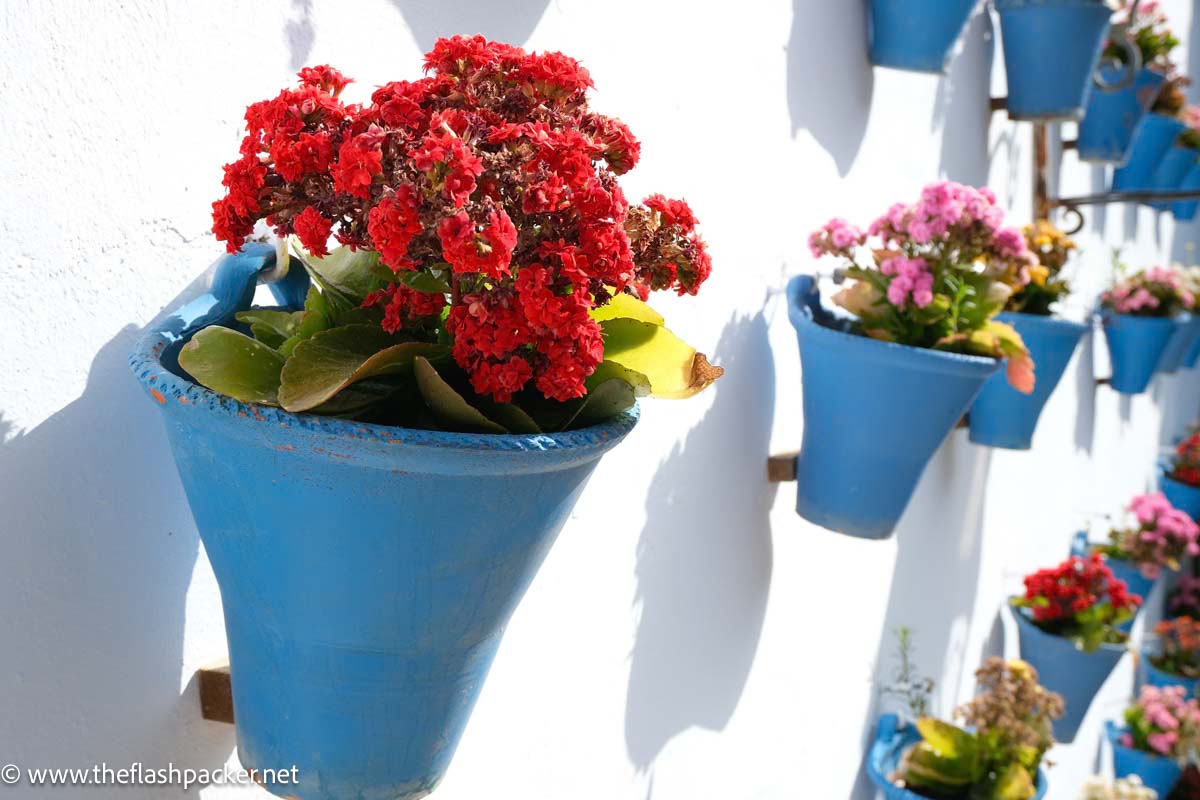
- How to get from Málaga to Granada: Alsa bus
- Journey time: From 1 hr 20 minutes
- More information: How to Get from Málaga to Granada by Train, Bus and Car
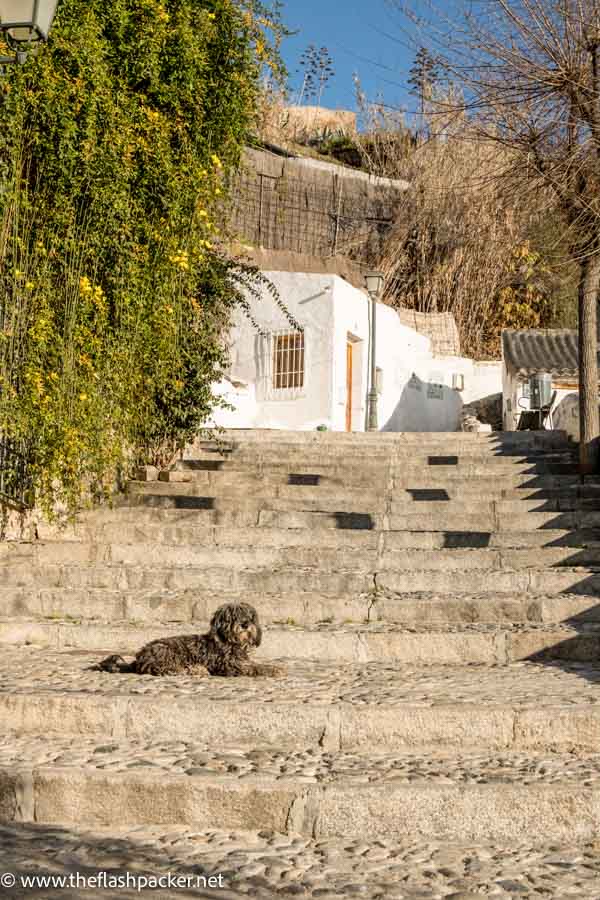
- How to get from Málaga to Seville: Train
- Journey time: From 2 hours
- More information: How to Get from Málaga to Seville by Train, Bus and Car
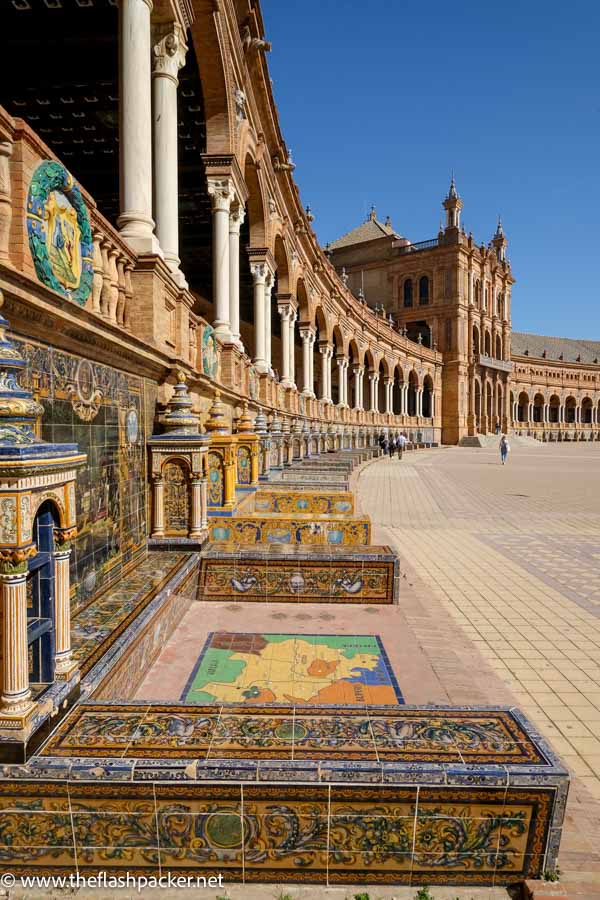
Is Málaga Safe for Female Solo Travellers?
Spain is a wonderful country for a solo trip.
It is one of the best countries for solo travellers in Europe, especially if you are travelling alone for the first time. I will go as far as to say that it is one of the best global solo travel destinations.
Not only does Spain have a rich history, vibrant cultural scene and buzzing nightlife, but it also has an excellent travel infrastructure.
Keeping safe when travelling alone is a key concern of female solo travellers. Málaga is a relaxed destination full of people of all ages, locals and visitors alike, enjoying its attractions, bars and restaurants. Even after dark on weekdays, I felt safe.
That said, like some other major cities, watch out for pickpockets, especially in popular tourist areas and transport hubs. Remain vigilant and keep your belongings close to you. If you have a safe at your accommodation, use it to store valuables.
I hope that you have a fabulous weekend in Málaga
If you are planning a trip to Andalusia, take a look at my 3-day itinerary for Seville, the region’s vibrant capital. If you have less time there, you can hit the highlights in just one day in Seville.
To help you make the most of your time in this vibrant city, I have an in-depth guide for visiting the Real Alcázar of Seville and top tips for visiting Seville Cathedral.
Although it may be hard to drag yourself away from Seville, check out all you need to know about a Seville to Granada day trip.
As the home of the Alhambra Palace, Granada is unmissable. But you should also take a look at other things to do in Granada.
I also have an in-depth guide describing how to spend a day in Cordoba (one of my favourite Spanish cities).
If you are planning to explore other cities in Spain, take a look at my ultimate guide to spending 2 days in Barcelona which includes tips for visiting La Sagrada Família. For a whistle-stop tour of the city, take a look at my 1-Day Barcelona itinerary.
More time in Barcelona? Then take a day trip to Tarragona, Spain’s Roman city by the sea.
Finally, take a look at my guide to Valencia, a vibrant city boasting a perfect combination of art, culture, history and food.
Happy travels!
PS. If you’ve found my 2-day Málaga itinerary helpful, Pin it to read later!



About Bridget
Bridget Coleman has been a passionate traveller for more than 30 years. She has visited 70+ countries, most as a solo traveller.
Articles on this site reflect her first-hand experiences.
To get in touch, email her at hello@theflashpacker.net or follow her on social media.
